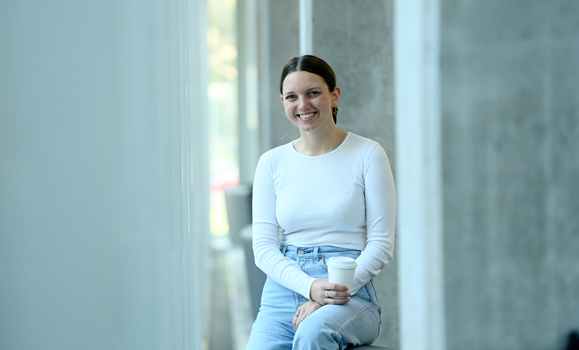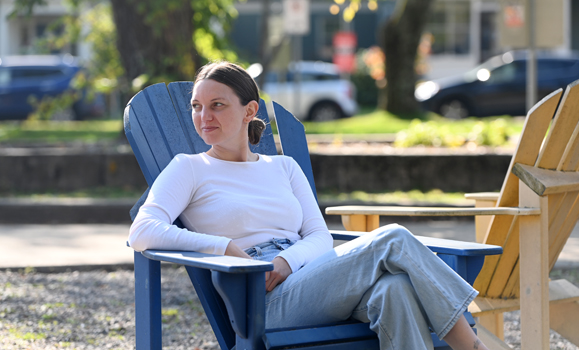This article is part of a series focusing on fall grads of the AVĺ„ņ÷≤Ņ Class of 2021. Visit our to share in the excitement with our newest graduates.
One of the most compelling aspects of studying women’s history for Holly Dickinson has been its power in helping her decipher the present.
Indeed, it was during a two-year stint working in digital media for a Toronto-based public policy platform that she was exposed to experiences and discussions that made her increasingly aware of gendered disparities within Canadian systems.
Increasingly intrigued by how things got this way, Holly decided to dive back into academia at Dal ‚ÄĒ spurred on by a love of research and writing as well as encouragement from a mentor she'd known since her days as an art history undergraduate student at Queen‚Äôs University.
‚ÄúI knew I cared deeply about women, women‚Äôs rights, the birth experience, holistic medicine, and, ultimately, wanted to know more about the historical events that influence my own experience in the world,‚ÄĚ says Holly, who graduated this fall from the master‚Äôs program in history at Dal and has just entered the PhD program.
Holly became particularly interested in researching, supporting, and advocating for women in the health-care system, adding that her interest in this field was sparked by her own experiences navigating reproductive healthcare.
‚ÄúSelf-advocacy is hard, especially within a medical system rooted in power dynamics,‚ÄĚ she says. ‚ÄúI know too many women, both through historical research and my personal network, who have felt invalidated and suppressed in medical settings.‚ÄĚ

Delving into domestic medicine
Holly took that passion and funneled it into her MA thesis, which explored domestic medicine in Nova Scotia (1750-1850) through The Manuscript Notebook of Sarah Creighton Wilkins (1811-1833) ‚Äď a text that is housed at the Nova Scotia Public Archives.
Holly’s research zeroed in on Creighton, the wife of a judge and daughter of wealthy Loyalists, who compiled 100 recipes in the early 19th century, 62 of which were medical remedies that suggest treatment for a variety of common and curious ailments and demonstrate the role of female healers when modern medical practices emerged as the dominant form of healthcare.
‚ÄúAlthough the remedies fluctuated in length, complexity, and peculiarity, they all shed light on Nova Scotian social medical history and the gendered and class implication of settler women in Nova Scotia,‚ÄĚ explains Holly. ‚ÄúMy intention was to consider how the collection‚Äôs materiality and content ‚ÄĒ including illnesses addressed and ingredients used ‚ÄĒ recoups a history of British settler women‚Äôs relationship with health and medicine through home practices, whether rooted in British tradition or reflecting the period‚Äôs evolving gender perceptions and expectations.‚ÄĚ
Holly’s PhD research will expand on her MA research, but with a shifted focus investigating the history of reproductive health and the birth experience through material and visual culture in Atlantic Canada.
She hopes her research, which highlights the history of the importance of female healers in Western medicine ‚ÄĒ a history, she says, has long favoured patriarchal ideologies that idealize a reliance on institutionalization and pharmacology ‚ÄĒ will help people better understand the impact that those attitudes and actions continue to have on today‚Äôs healthcare system.
‚ÄúFor example, Midwifery is undervalued and underfunded in Nova Scotia ‚ÄĒ and Canada at large ‚ÄĒ which is by no means a new issue,‚ÄĚ explains Holly. ‚ÄúWhile I know a historian can‚Äôt single-handedly strengthen Atlantic Canada‚Äôs health systems, I do think understanding how and why our systems are the way they are is a piece of the puzzle . . . It is my hope that uncovering marginalized health histories can lead to more intersectional and effective health policy in the future.‚ÄĚ

Reconnecting with the past in another way, too
While working her way through Queen‚Äôs, Holly, originally from Ontario, met Lisa Binkley, who is now an assistant professor in AVĺ„ņ÷≤Ņ‚Äôs Department of History. Dr. Binkley was working as a research supervisor at Queen‚Äôs while Holly was a research fellow ‚Äď but a mentorship and friendship followed soon after.
‚ÄúWe connected over shared life philosophies, senses of humour, and, of course, a love of historical research,‚ÄĚ says Holly.
Dr. Binkley helped lead Holly back to academia and to Halifax in 2019 to pursue a MA in History at AVĺ„ņ÷≤Ņ and ended up serving as her MA supervisor, continuing to do so now during her PhD.¬†
‚ÄúHolly's interdisciplinary background, combined with her interest in women's health, contribute to this new direction in research for her PhD project,‚ÄĚ says Dr. Binkley. ‚ÄúShe's an exceptional student, and I'm happy to see her undertake a topic she is passionate about and one that combines each of her disciplinary experiences.‚ÄĚ
Holly‚Äôs drive to support women‚Äôs health goes far beyond her research. She is the President of the Women‚Äôs Health Interest Group (WHIG). Founded in 2019 by Health Promotion graduate students, Emma Cameron and Kathryn Stone, the mission of this AVĺ„ņ÷≤Ņ society is to share research and knowledge pertaining to women's health and wellness and to promote multidisciplinary researchers and knowledge holders.
Additionally, Holly has been a practicing birth doula since spring 2021, volunteering with the Chebucto Family Centre’s Volunteer Doula Program.
‚ÄúI wholeheartedly believe that everyone who wants a doula should have access to one,‚ÄĚ says Holly.
‚ÄúOne of my goals as a PhD student exploring the history of women‚Äôs health and wellness and the birth experience is to ground my academic research in community, and I think providing doula support is a meaningful way to do so.‚ÄĚ

